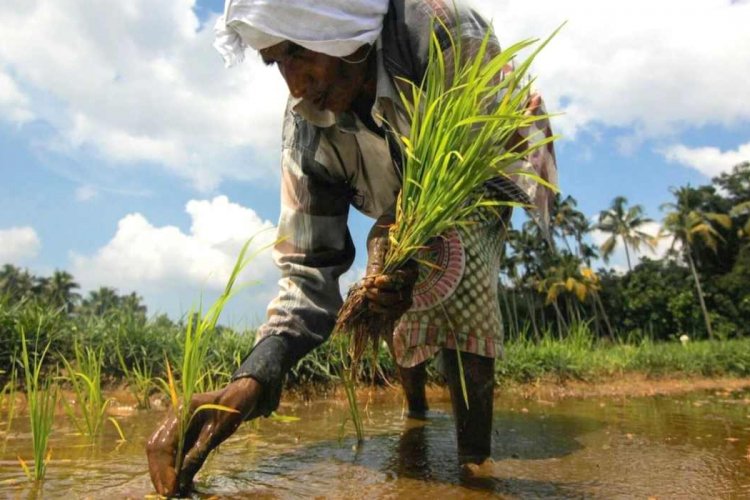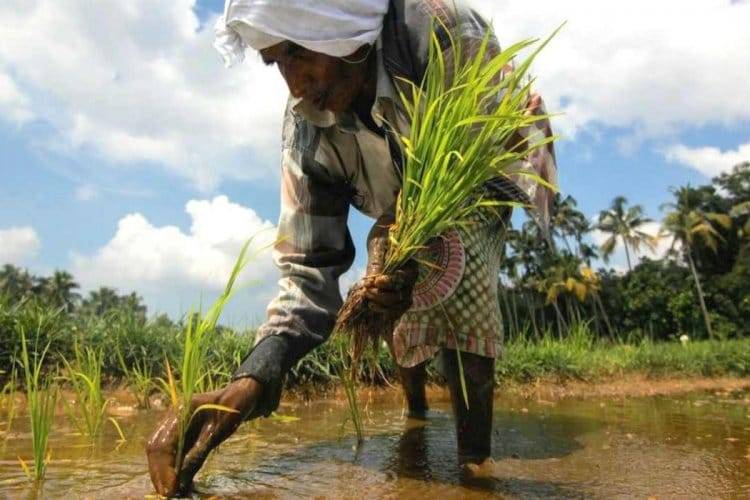Main Points In Hindi (मुख्य बातें – हिंदी में)
-
200 मिलियन डॉलर की परियोजना: विश्व बैंक ने केरल के किसानों को जलवायु परिवर्तन के अनुकूल ढलने और कृषि लचीलेपन को बढ़ावा देने के लिए 200 मिलियन डॉलर की परियोजना को मंजूरी दी है, जिसमें जलवायु-स्मार्ट प्रथाएं और छोटे तथा मध्यम उद्यमों (एसएमई) के लिए वित्त पोषण शामिल है।
-
किसानों को लाभ: इस परियोजना से लगभग 400,000 किसानों को जलवायु-अनुकूल प्रथाओं तक बेहतर पहुंच प्राप्त होगी, जो उनकी उत्पादकता और कृषि मूल्य श्रृंखला को मजबूत करने में सहायता करेगी।
-
महिलाओं के उद्यमों को बढ़ावा: विशेष रूप से महिलाओं के स्वामित्व वाले कृषि-खाद्य उद्यमों को विशेषज्ञता और वित्तीय सहायता प्रदान करने के लिए कार्यक्रम विकसित किए जाएंगे, जिससे इन उद्यमों की संख्या में भी वृद्धि होगी।
-
जलवायु परिवर्तन के प्रभाव: केरल के प्रमुख कृषि उत्पादों में जलवायु परिवर्तन, प्राकृतिक आपदाओं और बाजारों तक पहुंच में चुनौतियों का सामना करना पड़ रहा है, जिसके कारण किसानों को कठिनाइयों का सामना करना पड़ रहा है।
- उत्सर्जन में कमी और रोजगार सृजन: परियोजना का उद्देश्य ग्रीनहाउस गैस (जीएचजी) उत्सर्जन को कम करते हुए कृषि उत्पादकता को बढ़ाना है, जिससे केरल के कृषि क्षेत्र की प्रतिस्पर्धा और रोजगार के अवसरों में वृद्धि होगी।
Main Points In English(मुख्य बातें – अंग्रेज़ी में)
Here are the main points from the provided text regarding the World Bank’s project for farmers in Kerala:
-
Project Approval and Funding: The World Bank has approved a $200 million project aimed at helping farmers in Kerala adapt to climate change, enhance agricultural resilience, and promote agricultural entrepreneurs, particularly women.
-
Focus on Climate-Smart Practices: The project includes the implementation of climate-smart agricultural practices, partnerships with agricultural businesses, and financing for small and medium enterprises (SMEs), which are vital for strengthening the agricultural value chain in Kerala.
-
Support for Smallholder Farmers: Approximately 400,000 farmers will benefit from improved access to climate-friendly practices, which include replanting climate-resilient varieties of crops like coffee, cardamom, and rubber.
-
Encouragement of Women Entrepreneurship: The initiative aims to support women-owned SMEs, providing commercial viability training and access to financing, addressing the current low percentage (23%) of women owners in the state’s MSME sector.
- Sustainability and Job Creation: The project is designed to reduce greenhouse gas emissions, enhance the productivity of staple crops, maintain the competitiveness of Kerala’s agricultural sector, and ultimately create jobs and increase income for farming communities.


Complete News In Hindi(पूरी खबर – हिंदी में)

विश्व बैंक ने केरल के किसानों को जलवायु परिवर्तन के अनुकूल ढलने, कृषि लचीलेपन को बढ़ावा देने और कृषि-उद्यमियों, विशेषकर महिलाओं को बढ़ावा देने में मदद करने के लिए 200 मिलियन डॉलर की परियोजना को मंजूरी दी। इस पहल में जलवायु-स्मार्ट प्रथाएं, कृषि व्यवसायों के साथ गठबंधन और एसएमई के लिए वित्त पोषण शामिल है। इसका उद्देश्य केरल की कृषि मूल्य श्रृंखला को मजबूत करना और उत्सर्जन को कम करते हुए रोजगार पैदा करना है
विश्व बैंक के कार्यकारी निदेशक मंडल ने केरल में किसानों को जलवायु परिवर्तन के अनुकूल अनुकूलन करने और मूल्यवर्धित उत्पादों के विपणन में कृषि-उद्यमियों को बढ़ावा देने के लिए एक नए कार्यक्रम को मंजूरी दे दी है। यह कार्यक्रम वाणिज्यिक वित्त में कम से कम $9 मिलियन का लाभ उठाएगा, जिसमें कृषि-खाद्य लघु और मध्यम उद्यमों (एसएमई), विशेष रूप से महिलाओं के स्वामित्व वाले उद्यम शामिल हैं।
इलायची, वेनिला और जायफल जैसे मसालों के अग्रणी उत्पादक के रूप में, केरल भारत के कुल कृषि-खाद्य निर्यात का लगभग 20 प्रतिशत हिस्सा है। हालाँकि, जलवायु परिवर्तन इन उपलब्धियों में बाधा बन रहा है। बाढ़, जंगल की आग जैसी प्राकृतिक आपदाओं और व्यापक बाजारों तक पहुँचने की चुनौतियों ने किसान परिवारों को प्रभावित किया है।
विश्व बैंक द्वारा जारी एक प्रेस विज्ञप्ति के अनुसार, 200 मिलियन डॉलर की केरल जलवायु लचीला कृषि-मूल्य श्रृंखला आधुनिकीकरण (केरा) परियोजना राज्य के कृषि क्षेत्र की जलवायु परिवर्तन के प्रति लचीलापन को मजबूत करने में मदद करेगी। जलवायु-स्मार्ट प्रथाओं तक बेहतर पहुंच से लगभग 400,000 किसानों को लाभ होगा। इन प्रथाओं में जलवायु-अनुकूल कॉफी, इलायची और रबर की किस्मों को फिर से लगाना और केरल के “फूड पार्क” को ग्रामीण क्षेत्रों में विस्तारित करना शामिल है। ये पार्क खाद्य प्रसंस्करण और मूल्य वर्धित उत्पादों में कृषि व्यवसायों का समर्थन करने के लिए पानी, बिजली और अपशिष्ट प्रबंधन जैसे आवश्यक बुनियादी ढांचे प्रदान करेंगे।
विश्व बैंक के भारत के कंट्री निदेशक ऑगस्टे तानो कौमे ने कहा, “यह परियोजना निजी क्षेत्र के निवेश को और बढ़ावा देगी और किसानों और एसएमई के लाभ के लिए कृषि मूल्य श्रृंखलाओं को एकीकृत करेगी।” “इसके अलावा, यह कृषि आधारित एसएमई को समर्थन देगा – विशेष रूप से महिलाओं के स्वामित्व वाले, जो वर्तमान में राज्य में केवल 23 प्रतिशत एमएसएमई के मालिक हैं – व्यावसायिक योजनाओं के लिए प्रशिक्षण प्रदान करके और उनकी वाणिज्यिक व्यवहार्यता को मजबूत करके वाणिज्यिक वित्त तक पहुंच प्राप्त करने के लिए।”
परियोजना का उद्देश्य किसान समूहों और कृषि व्यवसायों के बीच उत्पादक गठबंधन बनाना भी है। ये गठबंधन उत्पादकों और खरीदारों के बीच संबंधों को मजबूत करने में मदद करेंगे, जिसमें सार्वजनिक क्षेत्र एक सुविधाजनक भूमिका निभाएगा। इसके अलावा, यह कृषि-तकनीक स्टार्टअप को बढ़ावा देगा।
प्रोजेक्ट के टास्क टीम लीडर क्रिस जैक्सन, अज़ेब मेकोनेन और अमादौ डेम ने कहा, “यह परियोजना ग्रीनहाउस गैस (जीएचजी) उत्सर्जन को कम करते हुए चावल जैसी मुख्य खाद्य फसलों की उत्पादकता बढ़ाने में मदद करेगी।” “उत्पादकता में वृद्धि और कृषि मूल्य श्रृंखलाओं की मजबूती से केरल के कृषि क्षेत्र की प्रतिस्पर्धात्मकता बनाए रखने और नौकरियां पैदा करने और आय बढ़ाने में मदद मिलेगी।”
इंटरनेशनल बैंक फॉर रिकंस्ट्रक्शन एंड डेवलपमेंट (आईबीआरडी) से 200 मिलियन डॉलर के ऋण की अंतिम परिपक्वता 23.5 वर्ष है, जिसमें 6 वर्ष की छूट अवधि भी शामिल है।
Complete News In English(पूरी खबर – अंग्रेज़ी में)
The World Bank has approved a $200 million project to help farmers in Kerala adapt to climate change, increase agricultural resilience, and support farmers, especially women entrepreneurs. This initiative includes climate-smart practices, partnerships with agricultural businesses, and funding for small and medium enterprises (SMEs). The goal is to strengthen the agricultural value chain in Kerala while creating jobs and reducing emissions.
The new program is designed to assist farmers in adapting to climate change and promote agricultural entrepreneurs in marketing value-added products. It will leverage at least $9 million in commercial financing, focusing on small and medium agricultural-food enterprises, particularly those owned by women.


Kerala, a leading producer of spices like cardamom, vanilla, and nutmeg, contributes around 20% of India’s total agricultural-food exports. However, climate change is posing challenges, with natural disasters like floods and wildfires impacting farming families and making it hard for them to access broader markets.
According to a press release from the World Bank, the Kerala Climate Resilient Agricultural Value Chain Modernization (KERA) project will help strengthen the state’s agricultural sector against climate change. About 400,000 farmers will benefit from better access to climate-smart practices, which include replanting climate-adapted varieties of coffee, cardamom, and rubber, and expanding Kerala’s “Food Parks” into rural areas. These parks will provide essential infrastructure like water, electricity, and waste management to support agricultural businesses focused on food processing and value-added products.
Augustin Tano Kouame, the World Bank’s Country Director for India, stated that the project aims to enhance private sector investment and integrate agricultural value chains for the benefit of farmers and SMEs. It will also support agriculture-based SMEs, especially women-owned businesses, by providing training for business plans and improving access to commercial financing.
The project also aims to create productive partnerships between farmer groups and agricultural businesses, strengthening the links between producers and buyers, with public sector support. Additionally, it will promote agricultural technology startups.
Project team leaders Chris Jackson, Azeb Mekonen, and Amadou Dem noted that the project will help increase productivity of staple food crops like rice while reducing greenhouse gas emissions. Boosting productivity and strengthening agricultural value chains will aid Kerala’s agricultural sector in maintaining competitiveness, generating jobs, and increasing incomes.
The $200 million loan from the International Bank for Reconstruction and Development (IBRD) has a final maturity of 23.5 years, including a 6-year grace period.
Source link




